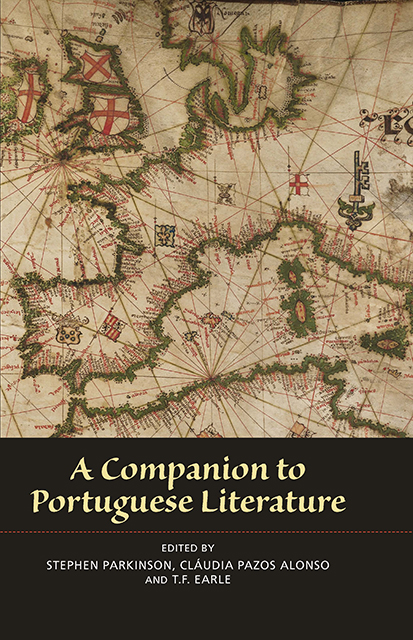Book contents
- Frontmatter
- Contents
- Acknowledgements
- Notes on the Contributors
- Introduction
- 1 Eight Centuries of Portuguese Literature: An Overview
- 2 The Medieval Galician-Portuguese Lyric
- 3 Fernão Lopes and Portuguese Prose Writing of the Middle Ages
- 4 Portuguese Theatre in the Sixteenth Century: Gil Vicente and António Ferreira
- 5 The Lusiads and the Literature of Portuguese Overseas Expansion
- 6 Lyric Poetry in the Sixteenth Century
- 7 The Seventeenth Century
- 8 The Eighteenth Century
- 9 Almeida Garrett: Founder of Modern Portuguese Literature
- 10 The Transition from Romanticism to Realism: Alexandre Herculano, Camilo Castelo Branco and Júlio Dinis
- 11 Eça de Queirós: A European Writer
- 12 Fernando Pessoa and the Modernist Generation
- 13 Narrative and Drama during the Dictatorship
- 14 Women Writers up to 1974
- 15 Writing after the Dictatorship
- 16 Portuguese Literature in English Translation
- Index
15 - Writing after the Dictatorship
Published online by Cambridge University Press: 03 March 2023
- Frontmatter
- Contents
- Acknowledgements
- Notes on the Contributors
- Introduction
- 1 Eight Centuries of Portuguese Literature: An Overview
- 2 The Medieval Galician-Portuguese Lyric
- 3 Fernão Lopes and Portuguese Prose Writing of the Middle Ages
- 4 Portuguese Theatre in the Sixteenth Century: Gil Vicente and António Ferreira
- 5 The Lusiads and the Literature of Portuguese Overseas Expansion
- 6 Lyric Poetry in the Sixteenth Century
- 7 The Seventeenth Century
- 8 The Eighteenth Century
- 9 Almeida Garrett: Founder of Modern Portuguese Literature
- 10 The Transition from Romanticism to Realism: Alexandre Herculano, Camilo Castelo Branco and Júlio Dinis
- 11 Eça de Queirós: A European Writer
- 12 Fernando Pessoa and the Modernist Generation
- 13 Narrative and Drama during the Dictatorship
- 14 Women Writers up to 1974
- 15 Writing after the Dictatorship
- 16 Portuguese Literature in English Translation
- Index
Summary
Esta é a madrugada que eu esperava This is the dawn I waited for
O dia inicial e limpo The new day clean and whole
Onde emergimos da noite e do silêncio When we emerge from night and silence
E livres habitamos a substância do tempo To freely inhabit the substance of time
Sophia de Mello Breyner Andresen, ‘25 de Abril’ (1974), translated by Richard ZenithNo matter how often Sophia de Mello Breyner Andresen's salutation to 25 April 1974 is quoted, it avoids the status of cliché through its succinct encapsulation of so much of the ethos of the ‘Carnation Revolution’. Into four lines are concentrated not simply the euphoria and optimism inspired by the almost bloodless fall of the Estado Novo, and the belief in a fresh beginning, but also, and more significantly, the liberty to partake of a new and more dynamic relationship with time and history. After having their eyes, ears and mouths confounded by the night and silence of tyranny, and having being trapped in the socio-economic and cultural time-warp forged by Salazarism's reactionary cult of tradition, the Portuguese were now free not only to engage with a fast-changing outside world, but equally to reflect upon and debate established accounts of their history and heritage, and even to question notions of their collective cultural identity. It is no coincidence that so much of the literary production in Portugal of the thirty-five years since the Carnation Revolution discusses the social and political functions of art, reinvestigates the national and imperial past, and explores newly accessible cultural models and means of adaptation to the country's post-dictatorship and post-imperial situation.
The Carnation Revolution is often cited as the forerunner and model for the wave of mostly peaceful transitions to parliamentary democracy in southern, central and eastern Europe from 1975 to the early 1990s. What has been examined less is the worldwide influence of the impassioned discussion, at many levels in mid-1970s Portuguese society, of the means by which writing and culture might be deployed to consolidate democratic and libertarian principles, to articulate and address popular concerns, and to undo or at least to mitigate Salazarism's legacy of illiteracy and ignorance.
- Type
- Chapter
- Information
- A Companion to Portuguese Literature , pp. 182 - 201Publisher: Boydell & BrewerPrint publication year: 2009



